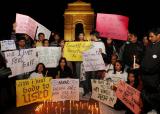 Sources said the hour-long special Cabinet meeting convened to clear the bill could not arrive at an agreement, following which Prime Minister Manmohan Singh referred it to a GoM.
Sources said the hour-long special Cabinet meeting convened to clear the bill could not arrive at an agreement, following which Prime Minister Manmohan Singh referred it to a GoM.
The proposed GoM is likely to have Finance Minister P Chidambaram, Women and Child Development Minister Krishna Tirath, Law Minister Ashwani Kumar, Home Minister Sushilkumar Shinde and Telecom Minister Kapil Sibal, sources said.
While there was unanimity in the Cabinet to pass the Bill, certain issues remained unresolved.
The bill proposes that the age of consent be lowered from 18 to 16. The issue had led to lengthy inter-ministry consultations with some arguing that it should not be reduced. The Women and Child Development Ministry had opposed the move.
Sexual intercourse under the age of consent is considered statutory rape.
Sources also said some senior ministers were not able to agree on issues such as whether the word "rape" - which is more gender specific- should replace "sexual assault" - which is gender neutral - in the proposal, and how to define voyeurism and stalking, which the bill identifies as criminal offences. The two were for the first time defined as criminal offsenses in the ordinance.
Some ministers expressed concern about not enough safeguards against false evidence and testimony.
The bill retains a key provision of the ordinance under which if rape leads to death of the victim or leaves her in a vegetative state, it can also attract death penalty. The minimum punishment is 20 years in jail which may extend upto the "natural life" of the convict.
The Criminal Law (Amendment) Bill, 2013 will replace the February 3 Criminal Law (Amendment) Ordinance.
The Ordinance will lapse on April 4 - six weeks from February 21 when the Budget session was convened.
Since the ordinance is the 'law of the land' as of today, cases of rape and similar crimes will continue to be registered under its provisions till the President signs the new bill to make it into law.
The Criminal Law (Amendment) Bill, 2012 introduced in the Lok Sabha in December last will be scrapped once the new bill is introduced in Parliament, most likely later this week.





Comments
Add new comment